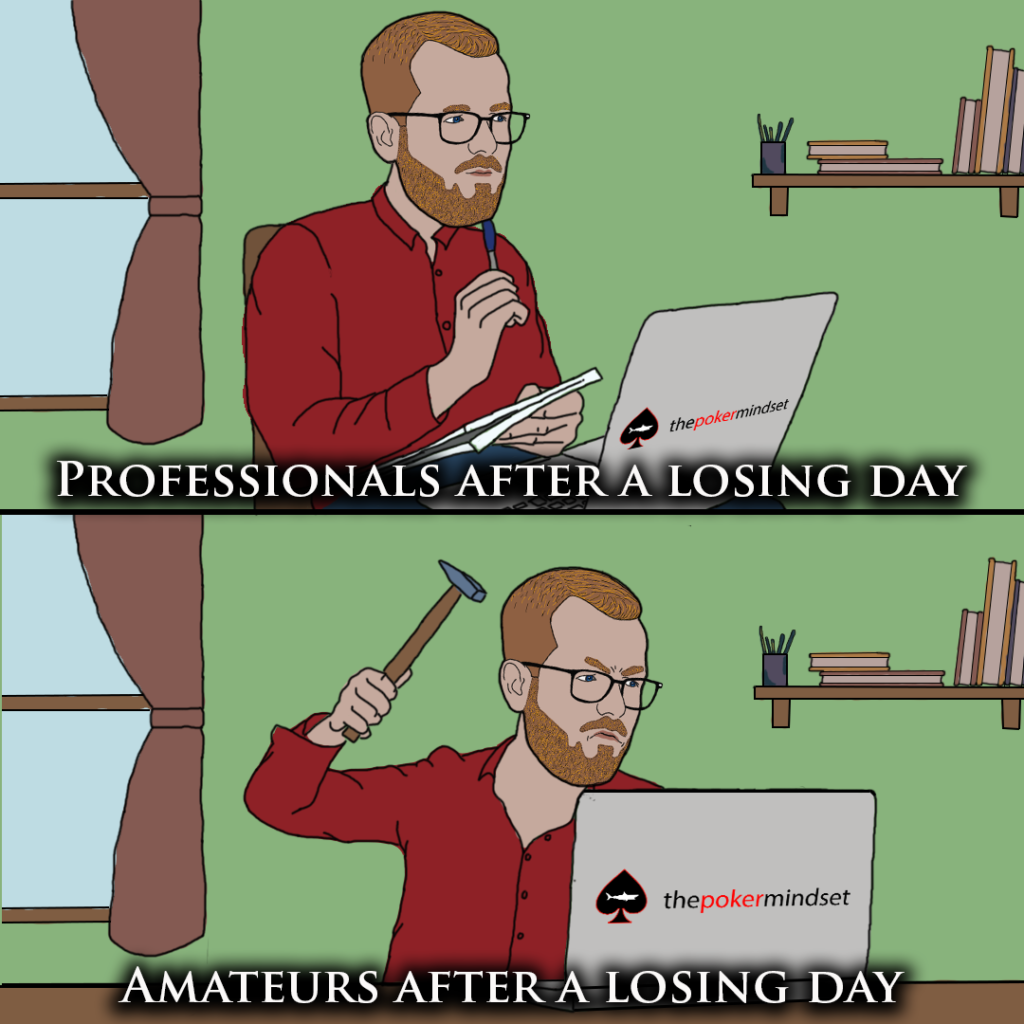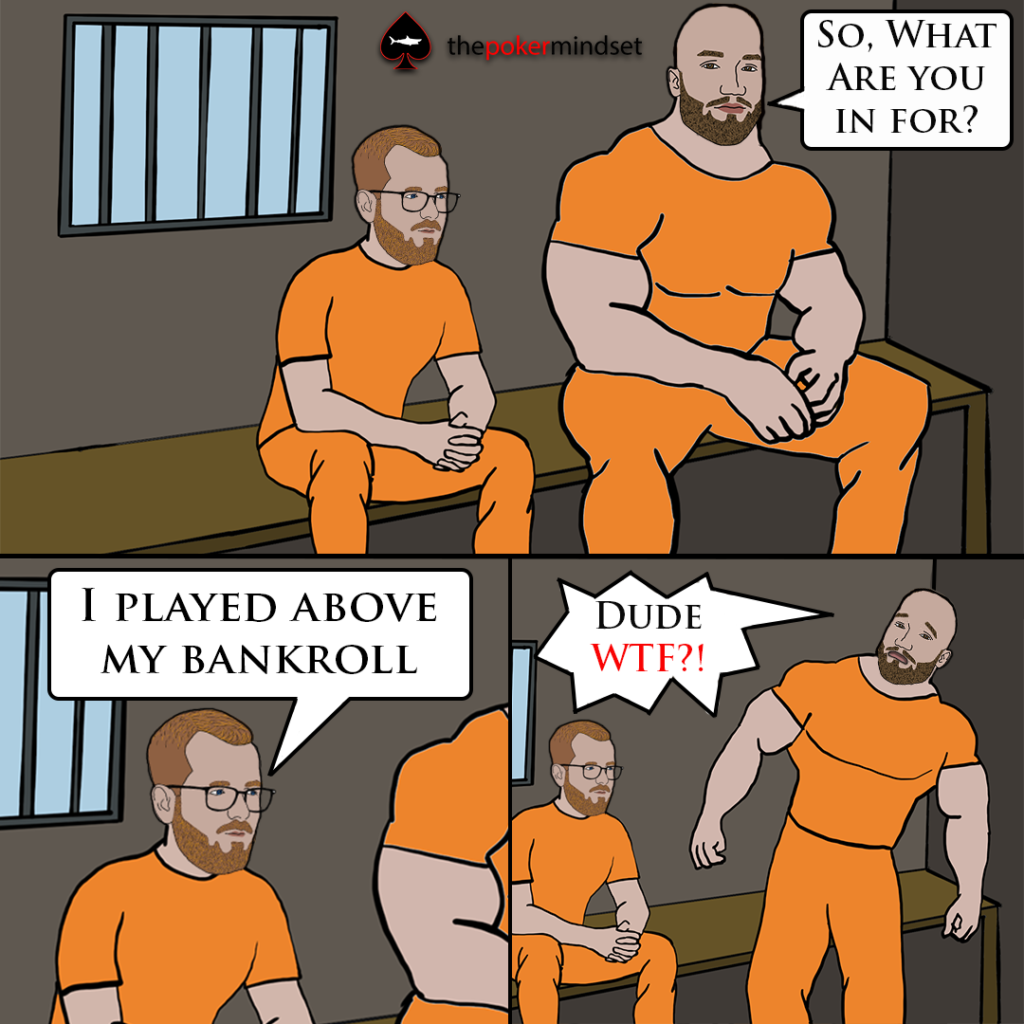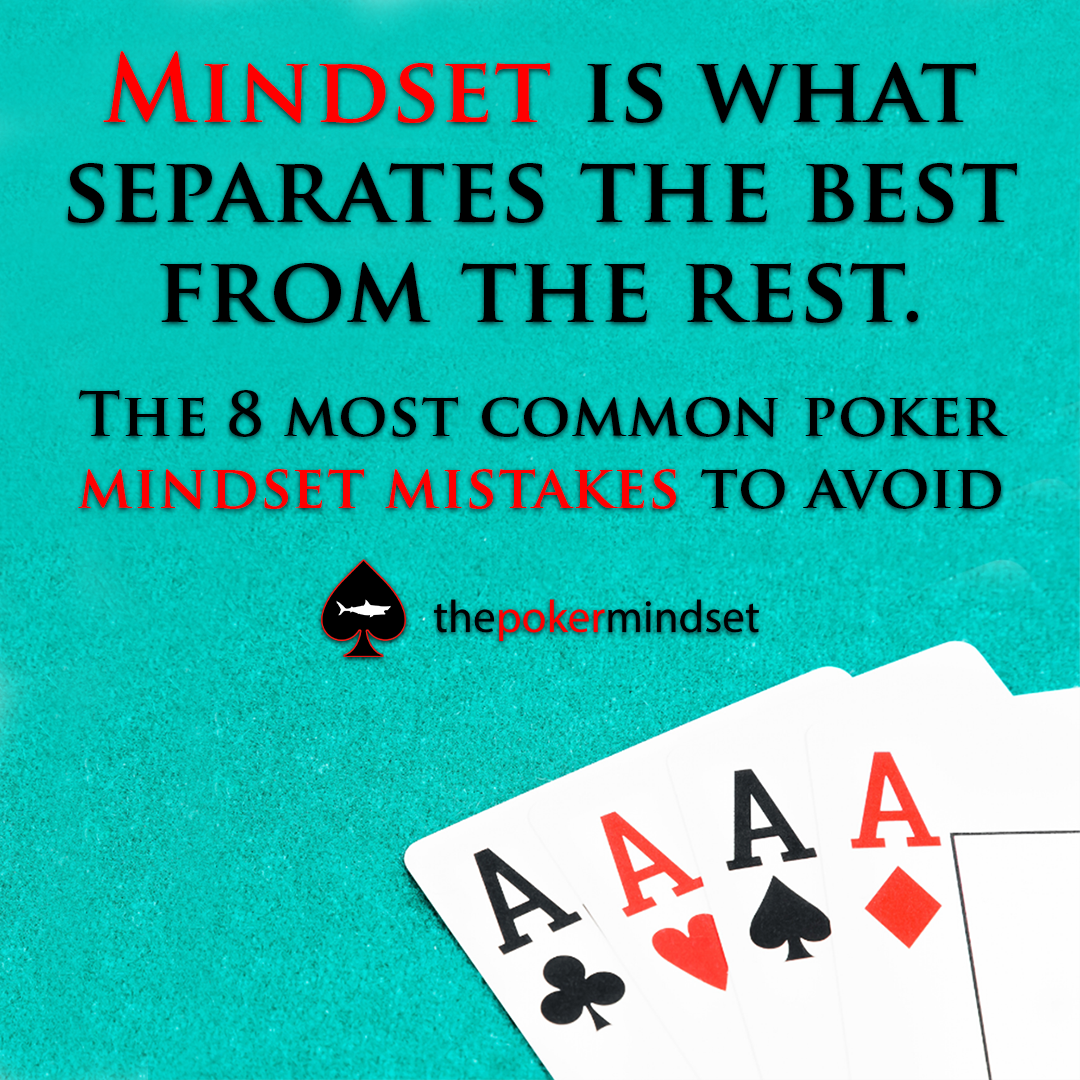Making progress and becoming a better poker player requires you to identify the mindset mistakes that hinder you. By being open minded and having a willingness to recognize them, you can avoid repeating the most common poker mindset mistakes players make.
The key to growth is learning from our mistakes. When it comes to poker, mistakes can cost a lot of money. Every poker player has made some or all of these mistakes at some point in their journey. Although some of them are simple to fix, others may be more difficult, but fixing them is essential.
Here are the 8 most common poker mindset mistakes to avoid. Enjoy!
Playing the blame game
”I am responsible for my poker results. I accept that I create my poker experience.” How did that feel? Think back to your poker career – has this been true for you? Have you taken responsibility for your results or have you looked to find something or someone to blame?
If you can’t admit when you’re wrong, you’ll never improve. At the poker table, it pays to be uncompromisingly honest with yourself.
Blaming other players, the dealer or the cards for your failure or losses is a great way to avoid taking responsibility for them. The more you blame someone or something else, the less control you have over your own progress and success.
“Work hard to recognize the instances where you’re blaming someone or something else, and redirect the responsibility back on to yourself. When you can accept blame and acknowledge your weaknesses, only then can you start to improve.”
Jared Tendler
Chasing your losses
Trying to get even as quickly as possible is another common poker mindset mistake players make. If you lose money in a hand, you will almost certainly feel some regret or disappointment. This can have an impact on your poker mindset because you want that feeling to go away. The best way to avoid making more mistakes is to learn how to react appropriately rather than avoiding this feeling.
After losing a big pot, most player’s first instinct is to get back the chips lost at all cost. Which often makes things worse and they end up losing even more or busting out of the tournament. Instead of desperately trying to get even for the day, concentrate on the present rather than the past, accept that it’s not possible to win every hand and focus on playing well.
Poker can be overwhelming, especially when you’re on a losing streak. I understand that quitting when you’re losing is difficult, but continuing to chase your losses will only worsen the situation. Taking a break instead of dwelling over your losses could be the right move. Focus on the long run. One terrible session doesn’t define your skill as a poker player.
Do you need a quick mindset boost? Click here to check out our eBook, 25 Poker Mindset Tips Every Player Should Know!

Loss aversion or playing scared
Another typical issue that many poker players face is trying to avoid losses by being overly careful, which leads to lower win-rate in the long run.
The biggest consequences of playing scared will be:
- If you’re worried about losing money, your hands will not be sufficiently protected. Your opponents will be able to realize their equity or hit their draws cheaply and beat you as a result of this.
- Your value bets will be small and you will not extract enough money in some profitable spots.
- Bluffing requires confidence and courage. Sometimes you will lose a lot of money when you get caught, but you shouldn’t care about this as long as the move had a positive expectancy. If you’re playing scared you won’t bluff enough or you won’t be able to pull the trigger when it’s necessary, which will make your game overly predictable.
- Opponents can notice that your playing scared and will start bluffing you on every possible spot.
Remember: Scared money doesn’t make money.
Note: Click here to read our article on how to overcome your fears in poker.
Playing when tired or in a bad mood
We all have lives outside of poker, and it can sometimes affect our poker game. Maybe you had a bad day at work or a fight with somebody? Or maybe you didn’t sleep well or you’re simply exhausted? This isn’t the state of mind you want to be in when making big decisions and facing tough opponents. Take the day off. Playing with a compromised mindset can deplete your bankroll and a bad session will only make things worse.
If you’re tired or not in the right mood, stay away from the poker tables!
Tilt

Tilt is probably the most common poker mindset mistake. Every poker player experienced some form of tilt during their sessions. My recommendation is to read Jared Tendler’s book: The Mental Game of Poker: Proven Strategies for Improving Tilt Control, Confidence, Motivation, Coping with Variance, and More. In my opinion it’s the best book out there on controlling tilt.
Click here to check it out on Amazon!
Quick Exercise:
Write down/ print out these five sentences, keep them on your desk and re-read them whenever you need them. These statements will help you out deal with injustice tilt in the short run:
1. Learn to handle disappointment. You can’t be a poker player if you don’t.
2. Probabilities tell you what’s likely to happen, not what’s guaranteed to happen. Remember this next time you get a bad beat.
3. Poker is a very competitive game and you have to be able to handle getting your butt kicked.
4. Poker doesn’t care what you think is fair.
5. There’s nothing that’s deserved in poker. Cards don’t care about your feelings.
Not having a pre-session routine
Many top sports teams, businesses, the military and pro poker players who desire to perform consistently are fully aware of the importance of meticulous preparation. This level of preparation enables them to perform at their peak.
What do mediocre poker players and average athletes have in common? They both spend less time and energy preparing to perform than the best players and athletes. You can observe a casual gym goer do a quick leg shake or arm jiggle and know that all they want to do is start their exercising, same way as the mediocre poker player only wants to get in front of their computer or to the casino and quickly jump into a game.
If you want to become a great poker player, you’ll have to adopt performance habits that mediocre players may become tired of or feel uncomfortable adopting.
Related article: Poker Warm Up Routine – How The World Class Players Prepare For Poker Sessions
Playing Too Long Sessions
One of the most common poker mindset mistakes is playing too long sessions. Your aim should always be to play you’re A-game. By not taking regular breaks and playing too much, you’ll often end up realizing that in the last part of your session you’ve underperformed.
This mindset leak can be easily fixed by scheduling regular breaks. For example, after 1,5 hours of playing, you can take a 30-minute break. Make sure that in these 30 minutes you stay away from the computer or phone, instead take a walk, exercise or stretch your body, eat something healthy and hydrate. This will help you regain focus and perform well at the tables.
For tournament players: use your short breaks wisely, avoid social media at all costs, hydrate, make sure you get up from your chair, stretch, maybe do some pushups or anything to get the blood flowing.
Ignoring Bankroll Management
The common poker mindset mistakes list would be incomplete without writing about the importance of bankroll management. This is basically the number one reason players go broke.

For example, if you have a 500$ bankroll and you sit down to a poker table with all of it, how likely do you think it is to lose it all?
In a single session, I would say it’s around 60%, which is insanely high. And if you always sit down and play with all your money, the likelihood of going broke is 100%. As Daniel Negreanu said: “You could be the best player in the world, but if you play above your bankroll, like way above, you’re guaranteed to go broke.”
In conclusion, do yourself a favor and learn to properly manage your bankroll. You can only play and learn poker if you have money to sit down to a table.
Note: One of the essential qualities that distinguishes a casual gambler from a professional poker player is the ability to manage one’s bankroll. It not only saves you from losing all your money, it also teaches you discipline and self-control. Click here to read our bankroll management guide!
Conclusion
There are no magic cures to real mental game problems. If you want to improve, you have to put in the work. Sure, it’s going to come easier for some players than others. So what? If you have goals you want to achieve in poker, don’t let tilt, fear, motivation, or confidence problems deter you. The reward is out there right now for those players willing to do what’s necessary.
Do you need a quick mindset boost? Click here to check out our eBook, 25 Poker Mindset Tips Every Player Should Know!


